It was Mark Twain who said “truth is stranger than fiction, but it is because fiction is obliged to stick to possibilities; truth isn’t.” Mark Twain could have been speaking about Clifford Irving’s Howard Hughes hoax that’s based on a true adventure. Anyone will agree Irving’s story is stranger than fiction.
Clifford Irving traveled to Oaxaca, Mexico in 1971 to meet with a “friend of Octavio’s,” the code name for Howard Hughes. That, at least, is what he told his editors at McGraw-Hill whom he had convinced that he had the story of a lifetime at his fingertips, an opportunity to write an authorized biography of the illusive Howard Hughes. Actually, the Oaxaca trip was just the first step in intricately planned hoax. Rather than meeting with Hughes or his representative, Irving spent Valentine’s Day in Oaxaca with his Danish mistress at the historic Hotel Victoria overlooking the city.

Hotel Victoria Lobby, Oaxaca, Mexico
Nina Superstar! The Baroness van Pallandt, mother of three, whom one of the London newspapers had just voted among “the ten sexiest women in the world”—which accolade she had told me she considered one of the ten greatest practical jokes ever played. (quoted from The Hoax by Clifford Irving)

View of Oaxaca From Hotel Victoria
Mark Twain would have sympathized with the easily duped editors at McGraw-Hill. Twain himself was a sucker for get-rich schemes and bad business deals. The editors, however, were professionals. They hired hand writing experts, forced Irving to take a lie detector test, and consulted with experts on Howard Hughes before reaching the conclusion that Clifford Irving was the real deal. He wasn’t. He conned them into advancing hundreds of thousands of dollars in cash for a story that was a fabrication.
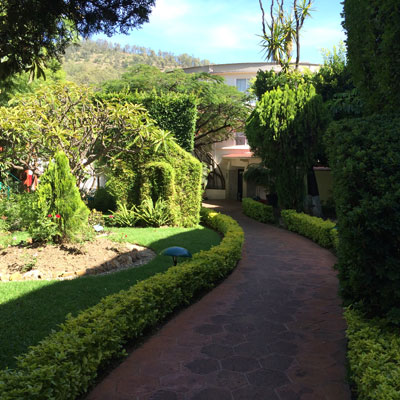
Entrance to Hotel Victoria Oaxaca
The whole sordid but fascinating mess is available in The Hoax, a tell all that Irving wrote after spending two years in prison and losing nearly everything. The book was made into a movie in 2006 starring Richard Gere. Irving was paid for the rights to the story, but he was not impressed with the movie.
This quote from an article in the Telegraph summarizes Irving’s feelings:
Irving displays faint enthusiasm for the film. It is, he says, ‘Ninety per cent fantasy – a hoax about a hoax featuring someone who happens to share my name’. Richard Gere is ‘too old for the part’ (Irving was 40 at the time, Gere is 57); the film is set in Westchester County, a conservative suburb of New York, rather than the laissez-faire island of Ibiza; the depiction of Dick Suskind as a ‘self-righteous, whiny buffoon is all wrong; Dick was jovial, droll, a scholarly rogue.’ Above all, Irving says, the film misses the point of the hoax. It depicts it as the act of a desperate man, bent on financial gain. It misses the fact that it was fun!
‘We were grown men playing games. We were just enjoying ourselves, and facing intellectual and personal challenges all the time. Maybe they were amoral – or immoral – but we didn’t grasp that. I don’t want to sound like an innocent. We knew we were doing something wrong. But boy, did we have fun doing it.’
For years the Autobiography of Howard Hughes that Irving fabricated remained unpublished, but it is now available. Even knowing in advance that the autobiography is all fiction, the book is a good read.
A few quotes from a New York Times article on the movie show that Hughes himself, though he disavowed the entire book, was fascinated by Irving’s story.
“All the world loves to see the experts and the establishment made a fool of.”
It is almost impossible, however, not to be awed by the hoax’s ramifications — inadvertently smoking out the elusive Hughes for what remains, to this day, one of the oddest Q & A sessions ever. Taking place in Los Angeles on Jan. 7, 1972, and captured by TV cameras, the surreal scene had seven reporters sitting around a horseshoe-shaped table, feeding questions to a disembodied voice coming from a speaker box atop a small, adjacent stand.
Hughes, talking from a penthouse suite in the Bahamas, some 3,000 miles away, proclaimed that he had never met Mr. Irving, and called the writer’s book “totally fantastic fiction.” However, Hughes, a former filmmaker and studio chief, conceded that the saga had cinematic possibilities. “I only wish I were still in the movie business,” he said, “because I don’t remember any script I ever saw in Hollywood as wild or imagination-stretching as this autobiography yarn has turned out to be.”
“It was the first reality show,” said Joshua Maurer, one of the film’s producers.
Irving’s caper had serious political consequences. There is credible evidence that rumors about the book influenced the Watergate scandal that brought down President Richard Nixon. Hughes had been a secret contributor to Richard Nixon, his brother, and other political operatives associated with Nixon. Nixon was paranoid the word would get out about illegal contributions and that may have been one reason he authorized the break-in.
There is no need for me to retell a story that has already been well told many times by others and by Irving himself. My interest in Clifford Irving’s literary fraud is focused on a project I’ve been working on for some time—literature and Oaxaca. I love Oaxaca and I love good stories. Finding places where the two interface is a personal passion. A few paragraphs from The Hoax depict the Oaxaca that Clifford Irving saw in 1971. However discredited he may be based on the mistakes (or daring courage) he displayed in the Hughes episode, he is an accomplished writer. His observations of Oaxaca are short but memorable.
Oaxaca had not changed since 1955, when I had spent three months there on my first trip to Mexico.
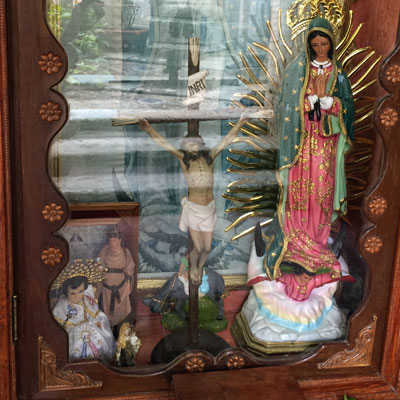
The Virgin of Guadaloupe. No estoy aqui, que soy tu madre? (Am I not here, who am your mother?)
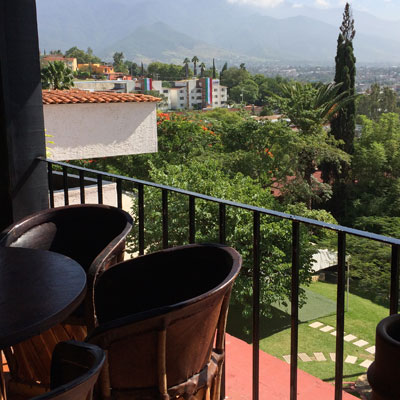
View from the historic Hotel Victoria Terrace Bar
Oaxaca was still a medium-sized pink-and-blue town in a lush valley surrounded by mountaintop ruins, a trading center for a dozen Zapotec Indian villages, with a plaza where you could drink cold Carta Blanca beer in the shade of the portales and buy a cheap handwoven serape and handwrought gold earrings from a local Indio vendor and listen to the marimba band three evenings a week. No new hotels had sprung up, although the plumbing had been improved in the old ones.

Clifford Irving and Baroness Nina van Pallandt stayed in a similar room to this one with a desk
Hotel Victoria. The gardens were fragrant with mimosas, bouganvillaea, and poinsettias.
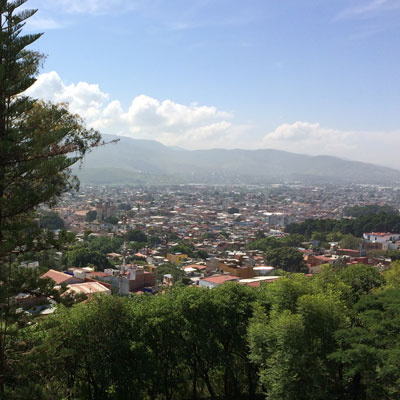
View from Room balcony
The next morning we rented a Volkswagen and drove to Monte Alban, a 2000-year-old ruin of a Zapotec priests’ city atop a mountain crowning the three valleys of Oaxaca. It was a clear, hot winter day and the sky was azure. We clambered through the temple ruins and drank cold orange soda in the shade of a tree and bought fake relics from a small Indian boy.
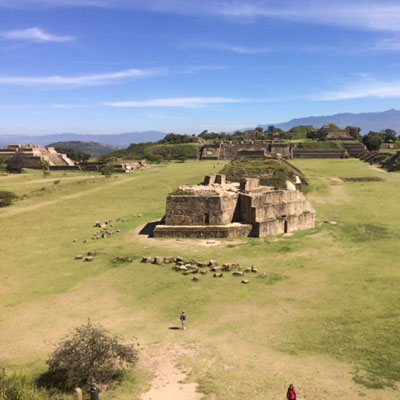
Monte Alban looking North
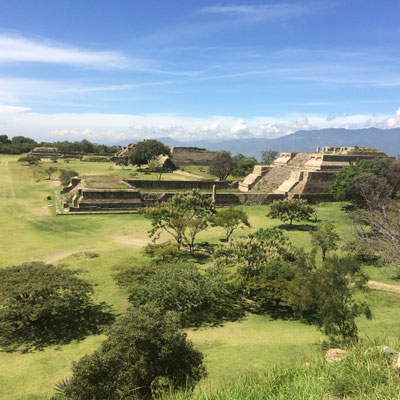
Monte Alban looking South
About two hundred miles to Tehuantepec and Salina Cruz, but we’ve got the Volkswagen. It’s mountainous country all the way. Very primitive, very beautiful.
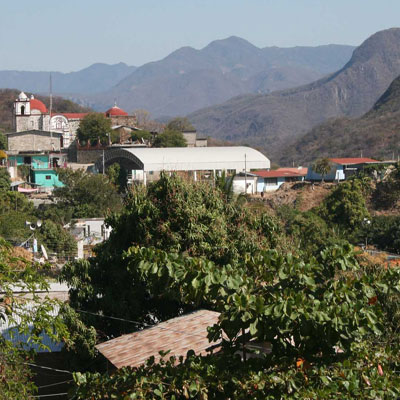
Santa Maria Totolapilla, mountain village near Tehuantepec
On the drive down to Tehuantepec on the isthmus, the next day, we stopped first at the ruins of Mitla. After that the road twisted through scarred, forsaken mountains, one hairpin curve after another, with the thatched huts of lonely Indian villages hidden in the vastnesses of the dark valleys. The morning was hot and cloudless. “What are you going to tell your publishers?” Nina asked. “That you spend all this time with Howard Hughes?”
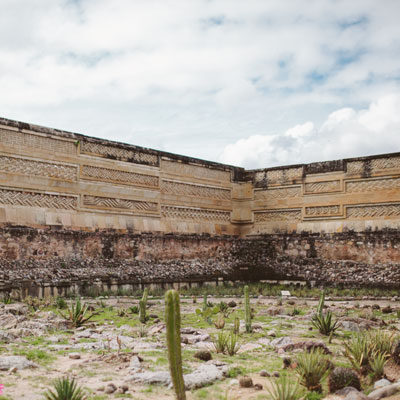
Mitla Ruins near city of Oaxaca
“I’ll use the facts. I’ll tell them we met yesterday at Monte Alban and that today he had me flown down in a private plane to Tehuantepec. There’s an airport at Juchitan. I checked the map. A Mexican pilot flew me down, a trusted Hughes aide. His name is … his name is Pedro. Does that sound like the name of a Mexican pilot?”
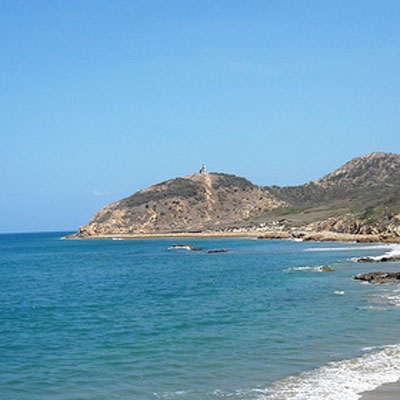
Salina Cruz

Las Palmeras near Salina Cruz
We bought a lunch in a small cantina near Tehuantepec and then drove across to the long, rough, sand beach at Salina Cruz. The Pacific was a bright, dark blue, but cold. We ate the tortillas and drank a bottle of white wine and walked up the length of the beach for nearly a mile, with the icy surf licking our feet. The beach was vast, deserted, and bravely we peeled down to swim. Then, shivering, we lay down together on my sweater and let the Mexican sun warm our bones. At three o’clock we left, driving back for five hours through the mountain darkness to Oaxaca. Our plane left at eight o’clock the next morning.
Irving’s escapade led to a two year jail term and left him impoverished. It’s a David and Goliath story that proves even the biggest and best corporations can be duped by a talented and creative writer. It may have played a role in the impeachment of a U.S. President. Irving has struggled to restore his reputation during all the subsequent years. The Hoax movie helped financially. He has finally, now in his 80s, began to publish again. However, as exciting as such a life might seem, Irving himself left anyone with similar designs a warning quoted below from the New York Times article linked earlier.
Still, Mr. Irving said he did not want to be perceived as cashing in on his crime. In an e-mail follow-up to his interview, he said that with the exception of the movie money, he has not benefited financially from the hoax. And, he stated, if the movie monies were divided by 34 — the number of years since the incident occurred — “you don’t even get close to minimum wage.” He further explained that, while in prison, he earned 21 cents an hour, as a clerk. He therefore cautioned “aspiring young hoaxers out there” that crime does not pay.
“Write good novels instead,” he suggested. “At least they keep you safe in your cubbyholes where you belong, and nobody will make a movie that pretends to be about you.”

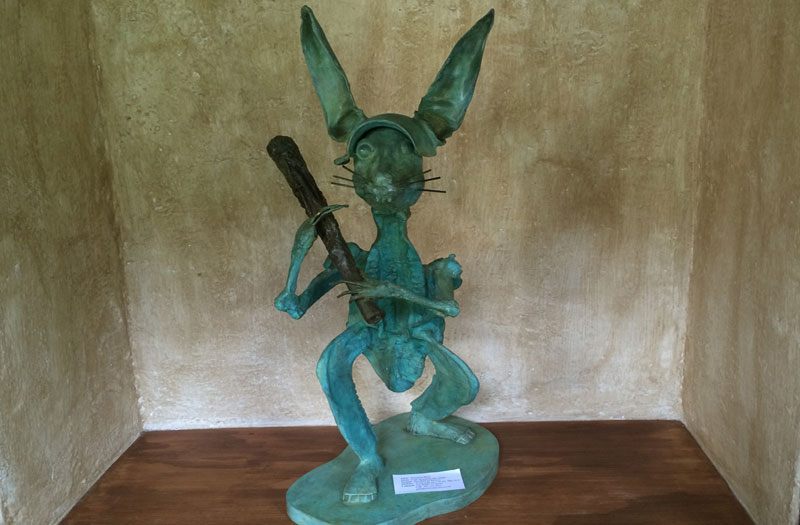
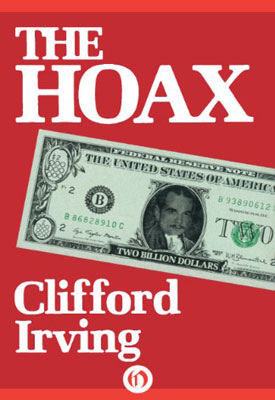
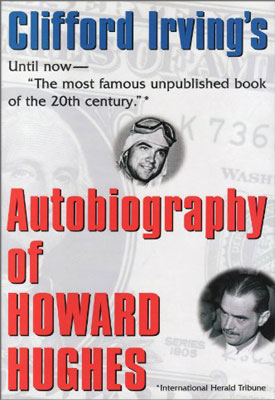
A fine piece, well composed and presented. The photos, mountings and captions are first rate. It does seem to take me to Oaxaca, with the added zip of the Irving story.
My first trip to Oaxaca was in 1969 with a UCLA tour to visit many ruins in Mexico and Guatemala. we stayed at the Victoria when in Oaxaca. I was with my mother and it was my first taste of the lands that we continue to seduce me for all these years.
The many treasures I encountered are now the best of my many travel memories.